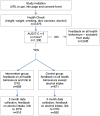Health on the web: randomised controlled trial of online screening and brief alcohol intervention delivered in a workplace setting
- PMID: 25409454
- PMCID: PMC4237335
- DOI: 10.1371/journal.pone.0112553
Health on the web: randomised controlled trial of online screening and brief alcohol intervention delivered in a workplace setting
Erratum in
-
Correction: Health on the web: randomised controlled trial of online screening and brief alcohol intervention delivered in a workplace setting.PLoS One. 2015 Apr 27;10(4):e0127371. doi: 10.1371/journal.pone.0127371. eCollection 2015. PLoS One. 2015. PMID: 25915505 Free PMC article. No abstract available.
Abstract
Background: Alcohol misuse in England costs around £7.3 billion (US$12.2 billion) annually from lost productivity and absenteeism. Delivering brief alcohol interventions to employees as part of a health check may be acceptable, particularly with online delivery which can provide privacy for this stigmatised behaviour. Research to support this approach is limited and methodologically weak. The aim was to determine the effectiveness of online screening and personalised feedback on alcohol consumption, delivered in a workplace as part of a health check.
Methods and findings: This two-group online individually randomised controlled trial recruited employees from a UK-based private sector organisation (approx. 100,000 employees). 3,375 employees completed the online health check in the three week recruitment period. Of these, 1,330 (39%) scored five or more on the AUDIT-C (indicating alcohol misuse) and were randomised to receive personalised feedback on their alcohol intake, alongside feedback on other health behaviours (n = 659), or to receive feedback on all health behaviours except alcohol intake (n = 671). Participants were mostly male (75%), with a median age of 48 years and half were in managerial positions (55%). Median Body Mass Index was 26, 12% were smokers, median time undertaking moderate/vigorous physical activity a week was 173 minutes and median fruit and vegetable consumption was three portions a day. Eighty percent (n = 1,066) of participants completed follow-up questionnaires at three months. An intention to treat analysis found no difference between experimental groups for past week drinking (primary outcome) (5.6% increase associated with the intervention (95% CI -4.7% to 16.9%; p = .30)), AUDIT (measure of alcohol-related harm) and health utility (EQ-5D).
Conclusions: There was no evidence to support the use of personalised feedback within an online health check for reducing alcohol consumption among employees in this organisation. Further research is needed on how to engage a larger proportion of employees in screening.
Trial registration: International Standard Randomised Controlled Trial Number Register ISRCTN50658915.
Conflict of interest statement
Similar articles
-
Online health check for reducing alcohol intake among employees: a feasibility study in six workplaces across England.PLoS One. 2015 Mar 23;10(3):e0121174. doi: 10.1371/journal.pone.0121174. eCollection 2015. PLoS One. 2015. PMID: 25798596 Free PMC article.
-
What do we know about alcohol internet interventions aimed at employees?-A scoping review.Front Public Health. 2023 Jan 26;11:929782. doi: 10.3389/fpubh.2023.929782. eCollection 2023. Front Public Health. 2023. PMID: 36778564 Free PMC article.
-
Health on the web: randomised trial of work-based online screening and brief intervention for hazardous and harmful drinking.BMC Public Health. 2013 May 24;13:505. doi: 10.1186/1471-2458-13-505. BMC Public Health. 2013. PMID: 23706155 Free PMC article. Clinical Trial.
-
The feasibility and effectiveness of a web-based personalised feedback and social norms alcohol intervention in UK university students: a randomised control trial.Addict Behav. 2008 Sep;33(9):1192-8. doi: 10.1016/j.addbeh.2008.05.002. Epub 2008 May 14. Addict Behav. 2008. PMID: 18554819 Clinical Trial.
-
Effectiveness of Workplace Intervention for Reducing Alcohol Consumption: a Systematic Review and Meta-Analysis.Alcohol Alcohol. 2019 May 1;54(3):264-271. doi: 10.1093/alcalc/agz024. Alcohol Alcohol. 2019. PMID: 30957142
Cited by
-
Randomised controlled non-inferiority trial of primary care-based facilitated access to an alcohol reduction website: cost-effectiveness analysis.BMJ Open. 2017 Nov 3;7(11):e014577. doi: 10.1136/bmjopen-2016-014577. BMJ Open. 2017. PMID: 29102983 Free PMC article. Clinical Trial.
-
Personalised digital interventions for reducing hazardous and harmful alcohol consumption in community-dwelling populations.Cochrane Database Syst Rev. 2017 Sep 25;9(9):CD011479. doi: 10.1002/14651858.CD011479.pub2. Cochrane Database Syst Rev. 2017. PMID: 28944453 Free PMC article.
-
Online health check for reducing alcohol intake among employees: a feasibility study in six workplaces across England.PLoS One. 2015 Mar 23;10(3):e0121174. doi: 10.1371/journal.pone.0121174. eCollection 2015. PLoS One. 2015. PMID: 25798596 Free PMC article.
-
What do we know about alcohol internet interventions aimed at employees?-A scoping review.Front Public Health. 2023 Jan 26;11:929782. doi: 10.3389/fpubh.2023.929782. eCollection 2023. Front Public Health. 2023. PMID: 36778564 Free PMC article.
-
Correction: Health on the web: randomised controlled trial of online screening and brief alcohol intervention delivered in a workplace setting.PLoS One. 2015 Apr 27;10(4):e0127371. doi: 10.1371/journal.pone.0127371. eCollection 2015. PLoS One. 2015. PMID: 25915505 Free PMC article. No abstract available.
References
-
- Lim SS, Vos T, Flaxman AD, Danaei G, Shibuya K, et al. (2012) A comparative risk assessment of burden of disease and injury attributable to 67 risk factors and risk factor clusters in 21 regions, 1990-2010: a systematic analysis for the Global Burden of Disease Study 2010. Lancet 380 (9859): 2224–60. - PMC - PubMed
-
- Office for National Statistics. General Lifestyle Survey (GLS), 2011 [database on the Internet]. [cited March. 2013]
-
- National Audit Office (2008) Reducing alcohol harm: health services in England for alcohol misuse. London: The Stationary Office (TSO).
-
- Moyer A, Finney JW, Swearingen CE, Vergun P (2002) Brief interventions for alcohol problems: a meta-analytic review of controlled investigations in treatment-seeking and non-treatment-seeking populations. Addiction (Abingdon, England) 97 (3): 279–92. - PubMed
-
- Kaner EF, Beyer F, Dickinson HO, Pienaar E, Campbell F, et al. (2007) Effectiveness of brief alcohol interventions in primary care populations. Cochrane Database Syst Rev (2): CD004148. - PubMed
Publication types
MeSH terms
Associated data
LinkOut - more resources
Full Text Sources
Other Literature Sources
Medical
Miscellaneous


